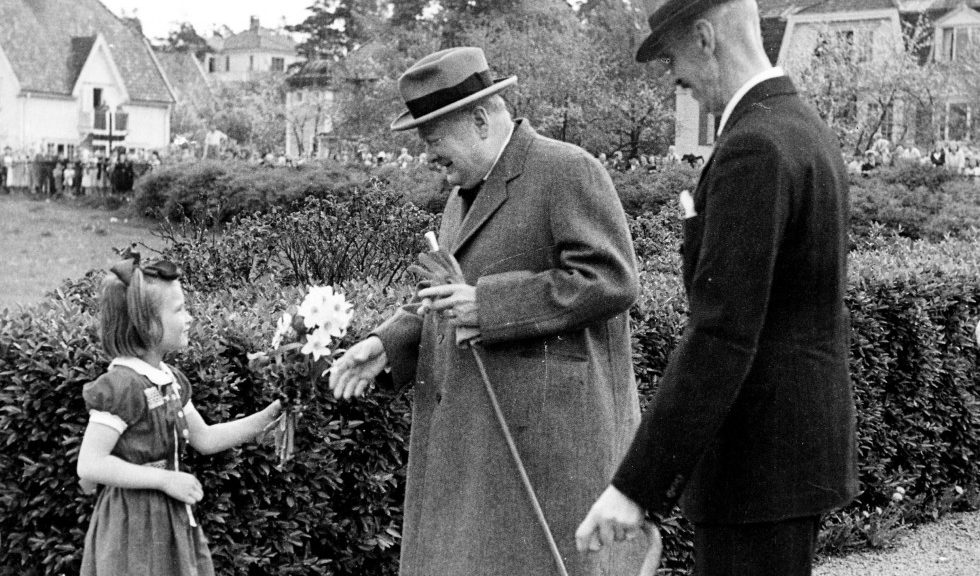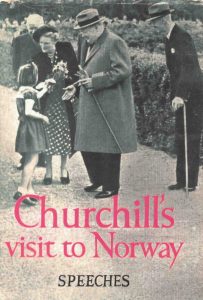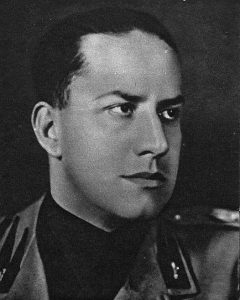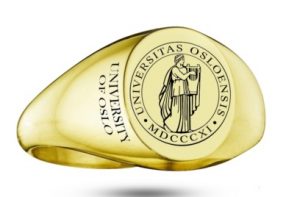
Churchill in Oslo, 1948: Stray Gems from a Distant Past
On 11-13 May 1948, Winston Churchill was in Norway to accept an honorary degree from Oslo University. He gave five speeches—University, City Hall, Storting (Norwegian Parliament) and two dinners. All five can be found in Churchill’s speech volume Europe Unite, or Winston S. Churchill: His Complete Speeches 1897-1963. They offer six gems of Churchillian wisdom. I plan to add them to the upcoming new edition of Churchill by Himself, my book of quotations.
Oslo Variations
 A reader reminds us of these obscure orations by sending one: Churchill’s dinner speech on May 12th. His source is Churchill’s Visit to Norway (Oslo: Cappelens, 1949). Curiously, we found wide variation and two omissions from Churchill’s Europe Unite. One omission involves Admiral François Darlan, who disgraced himself by refusing to safeguard the French fleet from a likely German takeover in 1940.
A reader reminds us of these obscure orations by sending one: Churchill’s dinner speech on May 12th. His source is Churchill’s Visit to Norway (Oslo: Cappelens, 1949). Curiously, we found wide variation and two omissions from Churchill’s Europe Unite. One omission involves Admiral François Darlan, who disgraced himself by refusing to safeguard the French fleet from a likely German takeover in 1940.
This raises a question familiar to quotations editors. Which is the authoritative text? My usual rule is to go by the final revised edition of Churchill’s own works, if possible. For Oslo 1948, that is Europe Unite, which had no later edition. (The Complete Speeches usually duplicates, more or less, his speech volumes.)
What about the passages reported by Cappelens but not in Europe Unite? Were the Norwegians editorializing? Not likely. Translation anomalies are one explanation. But the omitted sections do sound like Churchill. So it’s more likely that Randolph Churchill, editing Europe Unite, deleted them.
Darlan (and the subsequent British destruction of the French Fleet) are sore subjects among Frenchmen. While Randolph Churchill was editing Europe Unite, Churchill’s second volume of war memoirs, L’heure Tragique, was causing controversy in France over his account of France’s fall, including Darlan’s behavior. Randolph, or his father, may have judged it unnecessary to fan more flames.
Churchill by Himself: Maxims
Starting with “Maxims,” here are the new entries from Churchill’s 12 May 1948 Oslo dinner speech, arranged by subject and referenced by title and page number.
Kindness and Humility: “The more kindness I receive, the more humble I become.” —Europe Unite, 329. Churchill continued: “I know very well how vain it is for individuals to try to gather to themselves all the credit which really belongs to the great countries and the great nations whose virtues have had the opportunity of crediting to themselves in world history.”
Right and Wrong: “The problem of life is not presented to us as a simple calculation of what is wise and what is foolish…because judgments are falsified by events.” —Cappelens, 33. Churchill continued: “…if you will obey the promptings of your spirit or nature, when your conscience gives you such lights as may be granted, you will find that there is a way which is far safer in the long run than all the calculations of the most astute and clever politicians that have ever been made.” (This passage is not in Europe Unite or the Complete Speeches.)
World War II
Political Options, May 1940: “I have often been praised for things I said at the beginning of the War, when England was fighting alone. That was only expressions of my people [because] it was their courage and great qualities I put into words. And it was what my colleagues wanted me to say. If I had not, they would have pulled me to pieces, as I certainly would have pulled them to pieces the other way round.” —Europe Unite, 329.
People

Galeazzo Ciano: “Take for instance Count Ciano who started the attack on France and England in the moment when France was beaten. “France will not come again in five thousand years,” he said. But in two years the situation was changed. That does show how even seemingly clever calculations very often do not come off at all.” —Europe Unite, 330. Gian Galeazzo Ciano (1903-1944), Second Count of Cortellazzo and Buccari, Foreign Minister of Fascist Italy 1936-42. Executed by firing squad, 11 January 1944, at the behest of his father-in-law, Mussolini, under pressure from Germany.

François Darlan: “There was a man who had the French navy in the hollow of his hand; he had only to give the word to sail away to America, or to the French colonies, and he would have gone there, carrying with him the title-deeds of the France of the future, of Free France….But he cast it all away by calculation. He thought that to become Minister of Marine would give him more power at the time; and so he lost all that he cared most about, and his life was cast away in shame, where it might have been long preserved in honour, through calculation.” —Cappelens, 32. (This passage is not in Europe Unite or the Complete Speeches.ˆ)
Oslo University Ring
 “I thank you most cordially for your kindness and for all you have done for me. I wear the ring of the Oslo University on my finger and will consider it as a kind of marriage ring.I must confess that I have quite a selection of University Degrees and their insignias at home, but I have never received a ring with any degree before. “—Europe, 331. “What happened to the ring?” was the reader question that set off this trawl for Churchill’s Oslo remarks. The only University ring ever presented to him, it is unknown to his family, and its present whereabouts are uncertain.
“I thank you most cordially for your kindness and for all you have done for me. I wear the ring of the Oslo University on my finger and will consider it as a kind of marriage ring.I must confess that I have quite a selection of University Degrees and their insignias at home, but I have never received a ring with any degree before. “—Europe, 331. “What happened to the ring?” was the reader question that set off this trawl for Churchill’s Oslo remarks. The only University ring ever presented to him, it is unknown to his family, and its present whereabouts are uncertain.
Conjecture
Omissions from speeches pose a question for nitpickers and fussbudgets like me. Why? Cappelens probably translated the text from Norwegian news reports, That would explain part of it—but not the huge passages about Darlan and “the problem of life,” missing in the speech volumes.
Were the Cappelens people editorializing? It seems unlikely. The Darlan text sounds like genuine Churchill prose. More likely Randolph Churchill, the editor of Europe Unite, did a little culling. Perhaps he desired not to ruffle French feathers over Darlan. His father always felt Darlan lost his chance at glory by refusing to safeguard the French fleet after the Fall of France in June 1940. This caused Churchill and the Royal Navy to attack a good part of it at Mers el-Kebir, a sad chapter in wartime history.
The omission of Churchill’s musings over “the problem of life” is harder to explain. Nevertheless, this was an interesting exercise in the establishment of texts. It serves as a warning which Churchill himself often quoted: “Verify your quotations.”







One thought on “Churchill in Oslo, 1948: Stray Gems from a Distant Past”
wonderful to read these new stories.
Comments are closed.